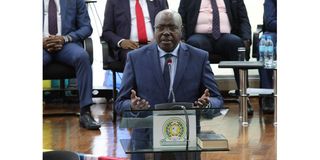Why new Eala speaker has his hands full

Mr Joseph Ntakarutimana, the new Eala speaker. PHOTO | COURTESY
What you need to know:
- Mr Joseph Ntakarutimana, the new speaker of the legislative organ of the East African Community, has a tough job ahead as he settles into the post for a five-year term
Arusha. He was full of joy and happiness when he took the mantle as the new Speaker of the East African Assembly (Eala) yesterday.
The soft spoken diplomat from Burundi pledged to make the seven-nation bloc ‘one family’ devoid of hatred and divisions.
But Joseph Ntakarutimana, the new Speaker of the legislative organ of the East African Community (EAC), has a tough job ahead.
Yesterday he began his five-year tenure in which he would preside on the House sessions and take part in its proceedings.
He did not spend much time planning out how he would carry out his duties after being sworn in during an elaborate ceremony in the Eala chambers.
But no sooner had the dust settled he would have to address the challenges which have haunted the regional Assembly.
These include reaching out to the regional leaders so that Eala is granted financial and administrative autonomy.
This would, among other things, enable the organ to improve its efficiency in discharging its oversight duties.
Eala, alongside the East African Court of Justice (EACJ), have repeatedly been calling for financial autonomy, in particular, for years.
This would enable the Assembly to manage its own finances now vested on the EAC secretariat, the powerful executive organ of the bloc.
It is the Arusha-based secretariat that receives funds from the partner states and development partners and later disburses to the organs and the EAC institutions.
While the arrangement has been criticised as being counterproductive, the new Speaker is set to realise that any change to the effect may need amendment of the EAC Treaty.
Another challenge that he is likely to face is what has often been raised by the regional MPs has been failure by some partner states to ratify key protocols.
The Eala members from the entire bloc have lately been unanimous on failure by the partner states to ratify or implement a host of the assented EAC protocols and laws.
A report tabled by Eala Committee on Legal, Rules and Privileges recently cited seven key protocols pending ratifications by the partner states.
As a result they could not be enforced because they have been ratified by different EAC member countries.
Mr Ntakarutimana’s election yesterday to replace Rwanda’s Martin Ngoga as Eala Speaker was devoid of drama unlike similar elections in 2017 and 2012.
Out of the 63 votes cast, which represented the number of lawmakers from the seven partner states, he received 54.
However,he initially faced opposition from candidates of at least two partner states that were eligible to field a candidate for the post.
Three MPs from South Sudan had picked forms to contest the post but later withdrew their names, one of them minutes before the vote.
The election process which took about three hours was presided by the Clerk of Eala Alex Lumumba Obatre with the assistance of Eala staff. In his acceptance speech, Mr Ntakarutimana directed his gratitude to those who decided to withdraw their candidature.
He said it was ‘unbelievable’ for him to ascend to such a senior position and the EAC organ, having originated from a humble background.
“I have been in politics for about 30 years as a diplomat and human rights crusader. But at one time I spent eight years as a refugee.
“This exposed me to various techniques. I know how to cook,” he said to the amusement of the MPs and members of the public at the packed chamber.
He said he was a member of one of the Burundi delegations, which signed the Arusha Accord in 2000 which brought into power the current CNDD-FDD government.
He committed to collaborating with other EAC organs and organisations to find consensus on new problems.
He would also reach out to the private sector which he described as the engine of regional integration efforts aimed to improve the livelihood of people. Mr Ntakarutimana becomes the sixth Speaker of Eala since the organ was established in 2001. The others include Abdulrahman Kinana from Tanzania.




